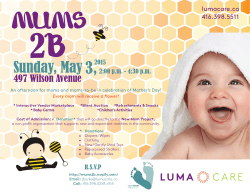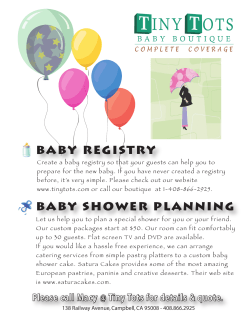
PERINATAL PRESS - the website of the Pennsylvania Perinatal
PERINATAL PRESS A PUBLICATION OF THE PENNSYLVANIA PERINATAL PARTNERSHIP www.PaPerinatal.org • www.DepressionStealsTheRealYou.org MOM IS SO SAD DESPERATE PLEA TO AND NO ONE DAD-TO-BE EXCLUSIVE! SEE PAGE 5 “I’m not crazy. I need help!” UNDERSTANDS I ALREADY FEEL LIKE A BAD MOM ‘What’s going to happen when the baby comes?’ FIND OUT NOW! INSIDE SCOOP ON PAGE 7! Page 9 ‘BUNDLE OF JOY’ A MYTH FOR NEW MOM PAGE 11 If you or someone you know is pregnant or a new mother, this booklet is for you. It is about a common condition called perinatal depression that affects 1 in 7 women* during pregnancy or up to one year after childbirth. Perinatal depression is more than the “baby blues.” It doesn’t go away on its own within a couple of weeks. Perinatal depression changes the way a woman thinks, feels and behaves. It can make her seem so different that the people who know and love her barely recognize the person she has become. Some women try very hard to hide their feelings and pretend everything is okay. Happily, with proper care and treatment, women who have perinatal depression can soon start feeling like themselves again. Sadly, too few women get the help they need. That’s why the Pennsylvania Perinatal Partnership created this booklet. We want to raise awareness about perinatal depression so more women get the help they need and deserve. For more information about perinatal depression and where to get help, call the Pennsylvania Healthy Baby Helpline: 1-800-986-BABY (2229) For nationwide 24-hour help, or in a crisis, call: 1-800-PPD-MOMS (773-6667) If you are interested in adapting this information for your state, email liz@PaPerinatal.org. PLEASE NOTE: The information in this booklet is not a substitute for personal medical advice, attention, diagnosis or treatment. If you have questions or concerns about your health or the health of your baby, consult your health care professional. *Source: Postpartum Support International, www.postpartum.net This booklet is a publication of the Pennsylvania Perinatal Partnership with funding from the Pennsylvania Department of Health and the Pennsylvania Department of Public Welfare. Creative services provided by Hollister Creative. 2 DEPRESSION STEALS THE REAL YOU Stop, thief! Gripping stories, startling facts, raw human emotion — that is the stuff of tabloid headlines. We can’t help but read them because they speak to our fascinations and our fears. Most of the time we are relieved that we don’t know the people involved. But sometimes there’s a connection. We know someone in a similar situation. Or maybe that someone is you. This booklet borrows from tabloid style to grab your attention with stories, facts and emotions related to perinatal depression. It’s a common condition affecting women during and after pregnancy. And it can be treated successfully if the woman gets help. You don’t know the people involved in the stories that follow. But you may know someone in a similar situation. And that someone may be you. If you sense a connection, you can stop a thief. That thief is depression, a condition that steals something more precious than any possession — it steals the thoughts, feelings and behaviors that make you you. To stop this thief, call the PA Healthy Baby Helpline at 800-986BABY. It’s free, it’s confidential, and it will connect you with a trained professional who can diagnose and treat perinatal depression. Don’t let depression steal the real you. Get help, and start feeling like yourself again. 3 Is depression stealing you? Mark the box beside any statement that describes how you have been feeling and acting during the past week or two: I feel sad or hopeless most of the time I don’t laugh at things like I used to I don’t enjoy doing things I used to enjoy I am more anxious and worried than usual I feel scared or panicky but I don’t know why I can’t concentrate or make decisions I am quick to blame myself when things go wrong It is hard to get to sleep and stay asleep I don’t have the energy to do what I should be doing I feel tired and just want to sleep all day I cry a lot because the smallest things upset me I have thoughts about hurting myself or my baby 4 Did you check more than one box? If so, you may have perinatal depression and you should get help right away. Contact your regular health care provider or call the PA Healthy Baby Helpline at 800-986-BABY (2229). The Helpline also welcomes calls from a family member, partner or friend of the woman who seems depressed. All information is free and confidential. Information is also available online at www.PaPerinatal.org and www.DepressionStealsTheRealYou.org. For 24-hour help or in a crisis, call: 1-800-PPD-MOMS (773-6667). MOM IS SO SAD AND NO ONE UNDERSTANDS “YOU SHOULD BE HAPPY” HER HUSBAND SAID “In my head I kept hearing why, why, why: Why do you feel so bad?” There was an answer, but Shawna didn’t want to hear it. “Depressed? No, that’s not me. I wanted this baby. I’ll be fine.” Her husband said, “We have a beautiful baby. You should be happy.” So how come she wasn’t? “My mom said, ‘A baby is a huge adjustment. You’ll come around.’ I wanted to believe her.” Her dad said, “There’s nothing wrong with you.” But something was definitely wrong. Finally an aunt who had battled depression recognized Shawna’s symptoms and urged her to call the hotline. The woman who answered assured Shawna that she was not alone: 1 in 7 women feel profoundly unhappy for no obvious reason before or after childbirth. She gave her the number for a local doctor who could help her. Now that she feels like herself again, Shawna hardly recognizes the helpless person she was. “I just never thought it would end. It felt like an eternal hell.” Shawna listened to her aunt’s advice and got help. You can get help by calling 1-800-986-BABY (2229). Why women don’t ask for help Some women won’t seek help for perinatal depression even though they are suffering from many of the symptoms (see list on page 4). What really happens when you get help is this: You start to feel better. You start acting like the mother and partner you always wanted to be. They may be afraid to tell anyone because they have fears like these: • “People will think I am a bad mother” • “My child(ren) will be taken away” • “I will lose my partner” • “I will be arrested or hospitalized” The truth is that all these are much more likely to happen if you DON’T ask for help. Depression that is not treated can get worse over time, making you less able to care for yourself, your baby and your family. To find a person who is trained to help you, contact your regular health care provider or call the PA Healthy Baby Helpline: 800-986-BABY (2229). Some woman don’t tell because they think feeling this way is normal when you’re pregnant or have a newborn. Or they think the feelings will go away soon. Or they think sharing these feelings with others would bring shame or embarrassment. The Helpline also welcomes calls from a family member, partner or friend of the woman who seems depressed. All information is free and confidential. Information is also available online at www.PaPerinatal.org and www.DepressionStealsTheRealYou.org. For 24-hour help or in a crisis, call: 1-800-PPD-MOMS (773-6667). DESPERATE PLEA “I’M NOT CRAZY. I NEED HELP!” “We can deal with this. We can handle it. That’s what I thought.” But Michael thought wrong. “Kia was acting like a psycho and she wouldn’t talk to me.” This woman was his best friend. They did everything together. And suddenly it was all falling apart. “After awhile I just lost it. I told her I didn’t want my kid to have a crazy person for a mom. Then I felt bad.” Kia got so upset. “I don’t know why I’m like this,” she cried. “But I’m not crazy. I need help!” “How could we handle it when we didn’t even know what it was?” Michael and Kia agreed to call the hotline. They were referred to a local doctor, who told them Kia was among the 1 in 7 women who feel profoundly unhappy for no obvious reason before or after childbirth. It’s hard for the women, but also for their partners, who can feel abused and confused when a woman they love suddenly seems like someone else. The doctor helped Michael get the real Kia back. Now they can’t wait to welcome their baby. Kia reached out to her husband and they got help. You can get help by calling 1-800-986-BABY (2229). Get help here! Here are phone numbers and Web sites where you can get free and confidential information about perinatal depression. PA HEALTHY BABY HELPLINE NATIONAL INSTITUTE MENTAL HEALTH (NIMH) OF 866-615-6464 www.MedEdPPD.org 800-986-BABY (2229) POSTPARTUM EDUCATION FOR PARENTS PENNSYLVANIA PERINATAL PARTNERSHIP 800-311-BABY (2229) 800-504-7081 (SPANISH) www.sbpep.org www.PaPerinatal.org DEPRESSION STEALS THE REAL YOU www.DepressionStealsTheReal You.org POSTPARTUM SUPPORT INTERNATIONAL (PSI) 800-944-4773 www.postpartum.net DEPRESSION AFTER DELIVERY, INC. (DAD, INC.) www.DepressionAfterDelivery.com Emergency! If you or someone you know is in a crisis or having thoughts of harming themselves or someone else, get immediate medical attention or call: NATIONAL SUICIDE PREVENTION LIFELINE 800-273-TALK (8255) 888-628-9454 (SPANISH) NATIONAL HOPELINE NETWORK 800-784-2433 PPD MOMS 800-PPD-MOMS (773-6667) 8 I ALREADY FEEL LIKE A “WHAT’S GOING TO HAPPEN WHEN THE BABY COMES?” “How can I not want a baby?” Diannah asked herself that question a hundred times a day. “I didn't feel this way with my first son, so it scared me. I thought I was being a bad mom… like being abusive before the baby even came out.” Fear and shame kept her from telling anyone. “I thought I was the only person who felt this way. I was scared what would happen if I told.” Diannah didn’t know that 1 in 7 women feel profoundly unhappy for no obvious reason before or after childbirth. They may cry a lot, sleep too much, eat too much or not enough, stress out, say mean things or say nothing. But sometimes the symptoms are less clear. Diannah’s own mom knew her well enough to sense that she was troubled and feeling down. When Diannah refused to talk about it, her mom wrote down the hotline number and left it on the counter for her. “Somehow it was easier to talk to a stranger. She really listened and then gave me a number for a doctor who could help me.” Diannah found the courage to call for help. You can get help too by calling 1-800-986-BABY (2229). Books BEYOND THE BLUES: A GUIDE TO UNDERSTANDING AND TREATING PRENATAL AND POSTPARTUM DEPRESSION DOWN CAME THE RAIN: MY JOURNEY THROUGH POSTPARTUM DEPRESSION Brooke Shields, 2005 Shoshana S. Bennett & Pec Indman, 2006 CONQUERING POSTPARTUM DEPRESSION: A PROVEN PLAN FOR RECOVERY Ronald Rosenberg, James Windell, Deborah Greening, 2004 POSTPARTUM HUSBAND: PRACTICAL SOLUTIONS FOR LIVING WITH POSTPARTUM DEPRESSION Karen Kleiman, 2000 SLEEPLESS DAYS: ONE WOMAN’S JOURNEY THROUGH POSTPARTUM DEPRESSION Susan Resnick, 2001 10 ‘BUNDLE OF JOY’ A MYTH FOR NEW MOM “I WAS JUST TOO TIRED TO CARE ABOUT HER” “I really thought I’d be happy, you know, bundle of joy and all that. But after I brought my baby home, I was just too tired to care about her or anything else. I wanted to sleep — all the time.” Jacqui is horrified at the memory. “When my husband came home from work I would still be in my pajamas. He would take the baby and I would go lay in the bathtub and cry.” When she wasn’t sad she was mad. “If he brought me home the wrong chocolate milk, I would scream and throw it at him.” Jacqui was among the 1 in 7 women who feel profoundly unhappy for no obvious reason before or after childbirth. They think and act in ways that upset them and the people around them, yet they can’t help themselves. Lucky for Jacqui, a girlfriend became concerned when she stopped by at 3 p.m. and saw the new mom in her PJs. She told Jacqui about the hotline. “They hooked me up with this really nice doctor who knew exactly where I was coming from.” Jacqui got help when a friend told her about the hotline. Get help by calling 1-800-986-BABY (2229). DEPRESSION STEALS THE REAL YOU. Get help, and start feeling like yourself again. Call the Pennsylvania hotline: 800-986-BABY
© Copyright 2025









